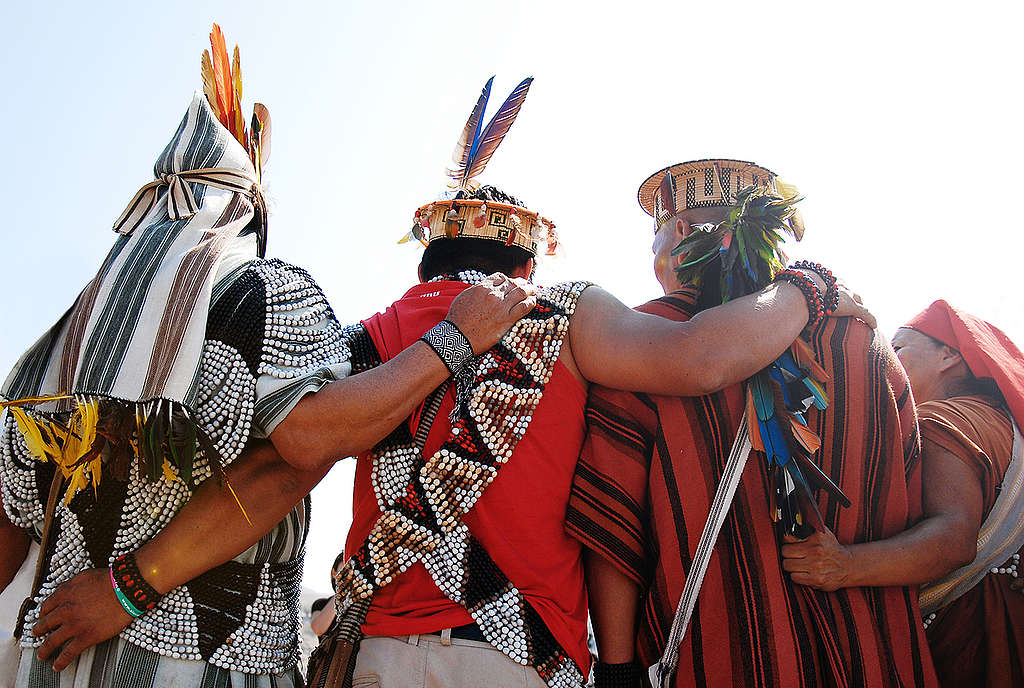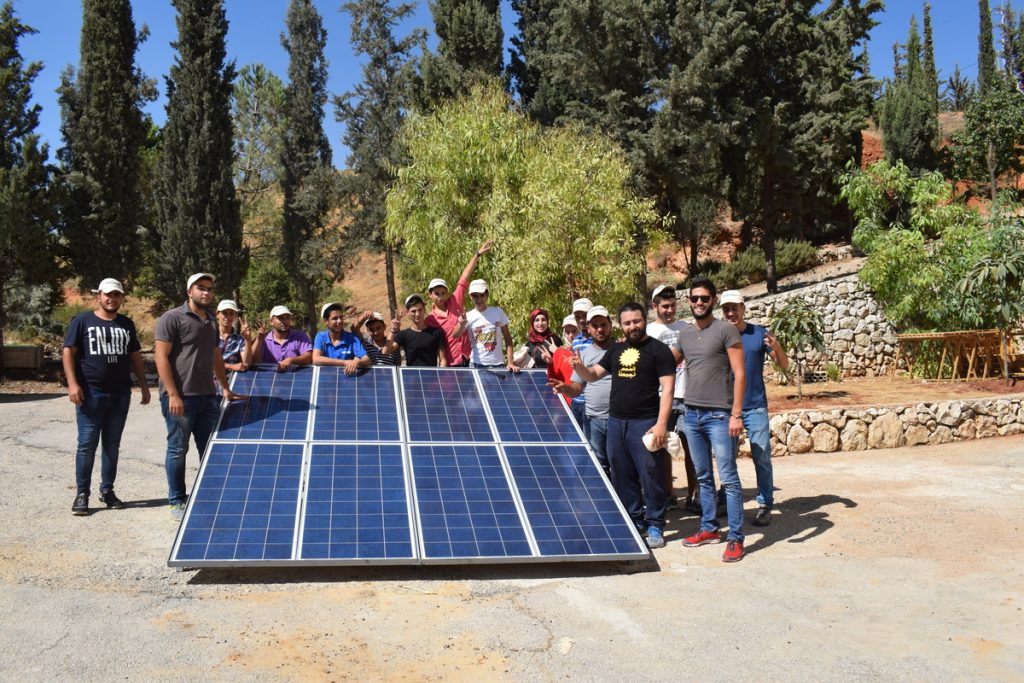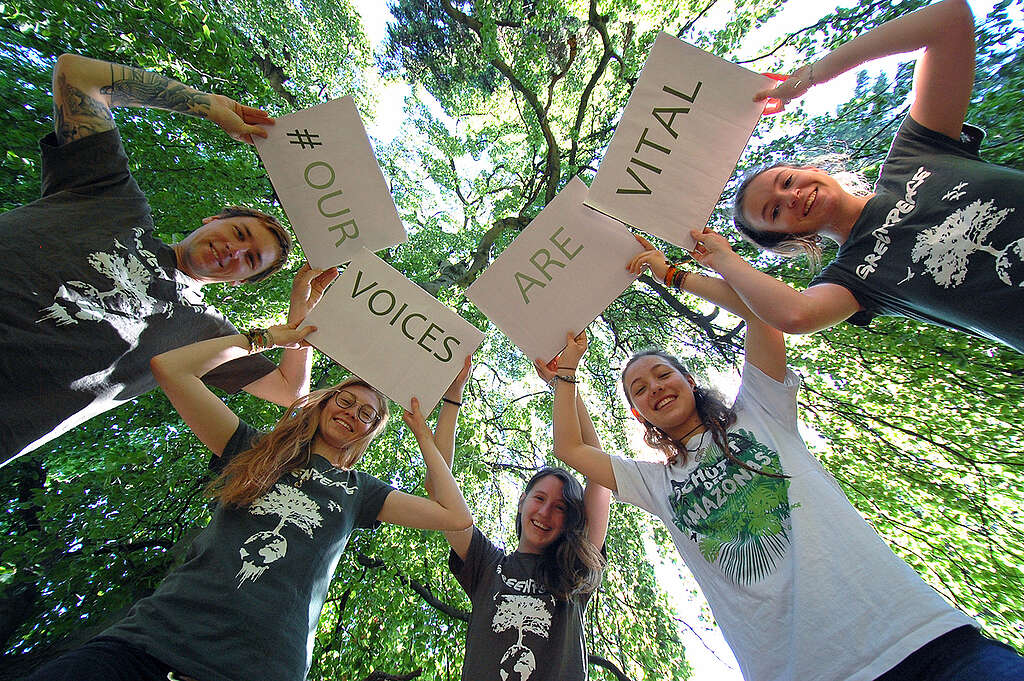We find ourselves at a turning point in history. The ongoing climate crisis coupled with socioeconomic breakdown has shown how fragile our world is, and how interconnected all of the systemic challenges our world faces are. Global conflicts and environmental degradation have contributed to spiralling energy and food prices, rising debt and increased cost of living, impacting communities around the globe.
How can we make sure that communities are able to define and control their own food systems according to local principles and knowledge? How can we work together to reduce the exploitation of nature and produce our own renewable energy? And how can we prioritise projects that generate well-being for people and regenerate nature instead of creating profit for corporations and fossil fuel extraction?
Greenpeace’s Alternative Futures campaign brings together knowledge and expertise from communities, groups, activists and experts around the world who are creating a different way of living. To live in this alternative future, the campaign proposes these 9 principles for change:
1. People and planet above profit and growth
In order to put people and the planet first, we need a food system which functions within ecological boundaries and with the social objectives of food justice. That means sustainable food production led by and for the people who have the right to control and define their own agricultural systems.
Our economies need to be built respecting the limits of the earth. We need to move away from individualism, competition and self interest, and instead prioritise cooperation, solidarity and empathy. Government budgets and public expenditure should be reallocated. Instead of chasing economic growth, our goal should be dignity, fairness and equality between nations and people.
 COP25, 2019. Thousands of people march in Madrid to demand politicians take ambitious action to protect the climate. © Pedro Armestre / Greenpeace
COP25, 2019. Thousands of people march in Madrid to demand politicians take ambitious action to protect the climate. © Pedro Armestre / GreenpeaceNation states’ debt to global institutions like the World Bank and the International Monetary Fund requires countries to chase economic growth and forces government policy and budgets to be based on loan conditions instead of focussing on people’s needs. This can only result in increased poverty and inequality. To truly prioritise people and the planet, cancelling national debt is a must and a complete overhaul of the global financial system is needed to bring about change.
2. Equitable distribution of wealth and power
By reforming our current financial systems we can enable the public to own and democratically control the financial system. Financial markets are then replaced by progressively planned public investment in creating industrial and agricultural sectors that meet the needs of the majority. The means of production and ownership would be decentralised and democratised, private property replaced by public ownership and cooperativism.
Fair income for all, such as the proposal for a Universal Basic Income, will help to overcome inequalities in all sectors of society. Introducing a progressive tax system that makes polluters pay will allow wealth to be redistributed and provides a strong incentive for products and services that reduce our impact on the environment.
3. Wellbeing at the core
We must challenge the focus on economic growth and GDP as the sole measure of a country’s overall welfare. This needs to be replaced by a bigger focus on the wellbeing of humans. Working less helps people and planet – humans have longer lives and better health, and moving away from overproduction and overconsumption supports a reduction in carbon emissions.
4. An Inclusive, just and diverse society
Promoting the economy of care means acknowledging informal, essential workers and households as an essential part of our economy and society.
There are numerous ways of living that respect the limits of Earth, modelled by many Indigenous and traditional communities around the world. We must elevate and support social movements that are fighting for their rights and for social and economic justice, and take inspiration from their knowledge.
The issues of gender inequity, environmental degradation, poverty and racism are closely connected. Empowering and supporting women is therefore key to living this future and ensuring all humans are equal. By supporting pluralist development models – in other words, recognising that there are different countries with different cultures and therefore multiple pathways to development – we can build alternatives to the dominant Western extractivist and destructive development model.
 2014: Greenpeace activists together with members of other NGOs from South America prepare to protest peacefully by forming a human banner at the beach of Chorillos in Lima, Peru, while the United Nation Climate Change conference (COP20) takes place in the same city. © Greenpeace / Eva Petschull
2014: Greenpeace activists together with members of other NGOs from South America prepare to protest peacefully by forming a human banner at the beach of Chorillos in Lima, Peru, while the United Nation Climate Change conference (COP20) takes place in the same city. © Greenpeace / Eva Petschull5. Resilience and community
We must promote an economy where goods are produced and consumed locally and ecologically. Trade should be about cooperation and international solidarity, not competition or self-sufficiency. Central to this sits the idea of a slow, circular economy which focuses on reducing consumption in the first place, and aims to reuse, repair and recycle in the second.
Energy is a natural commons, meaning it is shared by all of us – it should not be dominated by centralised powers and a handful of mega-corporations. Individuals and communities should have the right to make their own decisions about renewable energy generation, access and distribution.
 2017: Greenpeace Solar Technicians’ programme is enhancing the technical capacity of the Lebanese solar industry by creating a generation of qualified solar technicians. © Greenpeace
2017: Greenpeace Solar Technicians’ programme is enhancing the technical capacity of the Lebanese solar industry by creating a generation of qualified solar technicians. © Greenpeace6. Transparency and clarity
Innovation and creativity happen best when access to knowledge is shared openly and without restriction. We need to restore that access and ensure that information and communication – like the internet and public media – are an open, non-commercial public space whose aim it is to connect people with knowledge, not make a profit.
7. Real democracy
Real democracy means that commercial interests must be decoupled from politics. We need to ban corporate money and influence in our politics and elections. We must increase civic participation and foster active citizens instead of active consumers.
 In Graz, Styria, Austria, volunteers from Greenpeace Austria stand in solidarity with the message #OurVoicesAreVital to unite against Canadian logging company Resolute’s multiple lawsuits to stifle free speech and the organisation’s work to protect the Great Northern Forest in Canada. © / Greenpeace
In Graz, Styria, Austria, volunteers from Greenpeace Austria stand in solidarity with the message #OurVoicesAreVital to unite against Canadian logging company Resolute’s multiple lawsuits to stifle free speech and the organisation’s work to protect the Great Northern Forest in Canada. © / Greenpeace8. Cooperation and mutual benefit
In order to promote new forms of international and regional cooperation and integration, we must dismantle the dominance of the old systems and institutions. The free trade and growth-focussed ideology of the World Trade Organisation and the International Monetary Fund, for example, should be deconstructed. In its place, we can create room for regional institutions that are built on the principles of cooperation and mutual benefit instead of free trade.
9. Accountability
Corruption, nepotism and bribery are a major barrier to effective democracy in many countries around the world. Transparency is key to allowing citizens to oversee the state and private companies and hold them accountable. This includes ensuring government bodies make their decision-making processes transparent, and putting supply chain responsibility onto corporations so that they have to make sure that every step in the process to producing goods and services is environmentally sound and respects their workers’ human rights.
These 9 principles offer a pathway towards a fairer, greener and more peaceful world. The Alternative Futures programme wants to amplify and learn from the many solutions that already exist in practice, in particular those coming from the global majority. By learning from these existing solutions and drawing inspiration from them, we can start to build and shape the alternative world that we want to create.

We can build a green, fair and peaceful future that puts people and the planet before profit and growth.

 1 year ago
51
1 year ago
51

